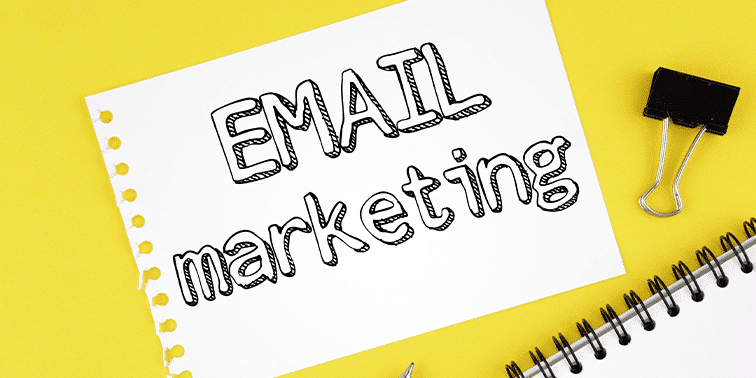Everyone wants to make their business stand out from the rest, but it takes more than a creative marketing strategy. The success of your small business depends on mastering all aspects of the marketing mix or the “4 P’s”- product, price, place, and promotion.
Email marketing is part of that equation because it can reach your audience directly, wherever they are – on their desktops, laptops, tablets or cell phones, when it’s convenient for them and through their preferred channel. Not to mention that email marketing costs less than some other marketing tactics and you can use the same message for multiple campaigns.
Keep reading for 12 tips to help boost your small business’s email marketing campaign strategies.
1. Build an Email List
Building an email list of potential customers is likely one of the first things you think about when considering email marketing campaigns. In fact, email marketing is all about building that list and keeping those potential clients interested in your small business.
If you already have a list of clients’ names, great! If not, don’t worry. There are a lot of ways to build a quality email list without spamming contacts. Here are a few ways to collect email addresses:
- Offer a freebie or special discount in exchange for an email address
- Use social media sites, such as Facebook and Twitter, to promote sign-up forms
- Encourage customers to sign up when they check out from an online store or place an order
- Promote an email sign-up link on your website
- Set up auto responders, which automatically send follow-up emails to anyone who subscribes or contacts you through your website. This way you can stay in touch with potential customers without the time commitment of writing personal emails.
2. Identify Your Target Audience
Before you begin strategising marketing campaigns, you must identify your target audience and their preferences. By creating different email campaigns based on the interests and needs of each group, businesses can reach out to new customers while keeping loyal fans engaged.
For example, if your business sells natural skincare products, you might want to send a campaign geared toward those interested in eco-friendly habits, including green or yoga living.
On the other hand, if your company offers business advice and professional services, potential clients may be interested in learning about new Tax advice or incentives for hiring employees.
3. Be Informative
One of the best ways to utilise email campaigns is to inform your customers about new products, sales, or updates. Customers are always looking for deals and bargains; email marketing can help you get in front of the right people at the right time.
Not only should your emails inform customers, but they should also give them what they want – fast!
4. Be Personal
Email marketing is one of the few internet marketing tools available to you that enables you to be personal in your company’s interactions with customers. You can, and should, let your voice come through when you write emails to customers.
When sending out emails from your small business, think about personalising your email campaigns to help build trust and credibility with your customers by showing them that you’re real – not some automated bot.
5. Test Your Campaigns
Before you set up your first email campaign, remember that there are no rules for this type of marketing strategy. By testing different messages, subject lines and frequency of emails, you can send out campaigns to small groups in order to optimise the content before launching a large-scale email marketing campaign.
Your business should test new ideas and strategies with a small group of clients or customers before sending them to the entire list. Consider asking for feedback from these early subscribers about which emails were most useful, interesting, etc., in order to make your future campaigns even more successful.
In addition, you can schedule different types of email campaigns to make the most of your marketing efforts. For example, you could offer a free product or service in exchange for an email address and send out newsletters weekly which include sales and up-and-coming products.
As with any marketing campaign, goals and objectives should drive the frequency and type of emails that are sent. If your small business has a limited budget, consider sending out informative emails monthly rather than bi-weekly.
6. Include Links/Buttons
Email marketing campaigns are most effective when they include links to company websites with additional information about new products and services. You can also include your contact information to encourage new business and enquiries.
Including links or buttons within the body of an email is an effective way of communicating with customers without having to worry about spam filters blocking out links that direct visitors off your site.
7. Take Advantage Of Mobile Devices
Ensure that your emails are compatible with all types of mobile devices and offer a web version if necessary.
8. Include A Call To Action
When writing emails to customers, remember to include a call-to-action within the body of the email to generate interest in your product or service. Adding a call-to-action button within the body of your emails will encourage customers to do business with you right away instead of visiting another website.
9. Remember Your Purpose
If your company is sending out emails for marketing purposes, keep your goals in mind when writing and setting up your campaigns. Your emails should be informative, easy to read and accessible to anyone who receives it.
10. Avoid Spam Filters
Spam filters are designed with the intention of keeping email marketers out of users’ inboxes, which means that important emails might end up in junk folders instead. To avoid this problem, make sure you avoid spammy words or phrases, use clean HTML and include opt-out options within the email.
11. Use A Professional Email Address
When sending out emails from your small business, be sure to create a separate account with an easy-to-remember address for your company instead of using the same one that you use for personal correspondence. This will help to avoid confusion and keep your professional email from being flagged as spam.
12. Track Your Results
Once you’ve launched and finished a successful email marketing campaign, track the results of your efforts by monitoring open rates and click-through rates. This type of tracking will allow you to discover which campaigns were the most effective at reaching your target audience.
Even after you’ve launched a campaign, keep an eye on the results to ensure that everything is running smoothly and efficiently. If certain elements are not working correctly or generating interest, make any necessary changes to improve your email marketing process. While it might take some time to perfect a campaign, the time spent is worth it in the end.
Email marketing agency Croydon
Smart Cow Marketing can create effective email marketing campaigns for your business, get in touch, and find out how Smart Cow Digital Marketing can transform your business.






